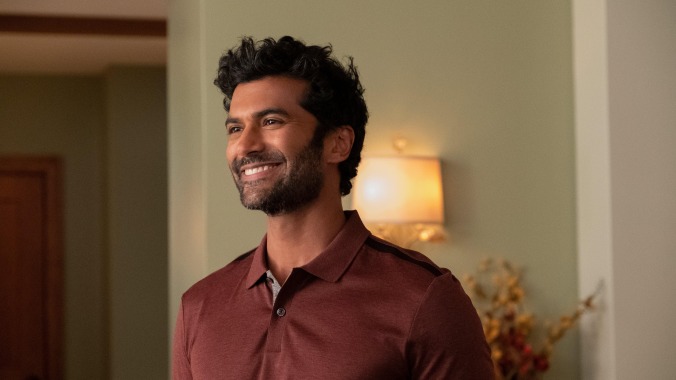Sendhil Ramamurthy in Never Have I Ever Photo: Lara Solanki/Netflix
Over a week into the SAG-AFTRA strike, the momentum is building—even without Tom Cruise’s presence (for now). Actors are joining their WGA counterparts, who’ve been on strike for almost three months, to fight for a fair contract. Now, both unions are gathering at the picket lines to make their demands clear. The A.V. Club was on the scene at the July 20 rally near 30 Rock to speak with some of the actors about the reasons they’re ready to strike for the long haul. A big one is residuals, a.k.a. the long-term payment they get for reruns and streaming.
Never Have I Ever’s Sendhil Ramamurthy told The A.V. Club that he’s earned only $800 for the show in residuals so far. “It’s insanity. It has to stop. That’s why I’m out here,” he said. Considering Mindy Kaling and Lang Fisher’s comedy was charting at number one globally the week of season four’s release this past June, the amount seems particularly low. It stayed in the top 10 for its first month, according to the streamer’s own data.
“Our contract was for the previous business model of network TV and DVDs. When I was on Heroes, we would sell hundreds of thousands of DVDs and get a piece of that with residuals. That doesn’t exist anymore. You go to Netflix, Hulu, or whatever account, to see it. And I see nothing or get pennies,” Ramamurthy told us. “NHIE was number one in a lot of countries. So was New Amsterdam when Netflix began streaming it. My residual payments are nothing. I don’t even think I’ve received one for New Amsterdam. Maybe it’s in the mail?” The actor recurred on NBC’s medical drama in 2018. “Residuals are how a lot of actors make their minimum for pension,” he added. “You have to make $26,000 per year to qualify for health insurance. That’s a lot of 1-cent checks.”
When the SAG and WGA last struck together in the ‘60s, one result was residual payments for films. Media consumption has shifted in the decades since, with streaming taking over the industry. True Blood and American Horror Story star Denis O’Hare was also at the picket line, further explaining how residuals are crucial for older actors and their families. “What people don’t understand is most actors don’t work their whole lives,” he shared. “I know some in their 80s and 90s, who’ve had years of a strong career, but can’t get healthcare anymore.”
O’Hare, who also starred in Dallas Buyers Club and The Proposal, spoke about his own residuals. “They keep decreasing every year til it’s just pennies. Studios, meanwhile, are still making revenue and reselling our work to foreign markets without telling us,” the actor said. “Corporations are big, blind animals looking for profit. I do get residuals from England sometimes because it’s not governed by the same body. They keep track of it and happen to pay me.”
You season one stars Elizabeth Lail and Kathryn Gallagher also echoed these statements, especially the ones made by Ramamurthy. Much like NHIE, You has also been a top performer for Netflix. On various occasions, the streamer has proudly proclaimed these shows were viewed by 40 million households.
“It’s wonderful and cool to hear that, but it would be cool to know everyone who worked on You was fairly compensated for it,” Gallagher says. “It’s easy to see recognizable faces and think it’s all glamorous, and in some ways it is, but there are actors you see on TV who are struggling to pay their rent because of how the streaming model is structured right now.” Her You and Gossip Girl reboot co-star Lail also took issue with Netflix’s decision not to share real viewership data with the creators of the show.
“At the picket lines, I’ve run into my You stand-in and costume designer. This is a reminder that it takes a village to make these things, so everyone who’s part of the show should be compensated fairly,” Lail recalled. The actors added that it’s scary and nerve-wracking to not know when they’ll work again, but, to them, the risk is necessary. “It’s already not stable. You never know where your next job is going to come from. That’s why residuals are so important.”










![Rob Reiner's son booked for murder amid homicide investigation [Updated]](https://img.pastemagazine.com/wp-content/avuploads/2025/12/15131025/MixCollage-15-Dec-2025-01-10-PM-9121.jpg)

























![HBO teases new Euphoria, Larry David, and much more in 2026 sizzle reel [Updated]](https://img.pastemagazine.com/wp-content/avuploads/2025/12/12100344/MixCollage-12-Dec-2025-09-56-AM-9137.jpg)




